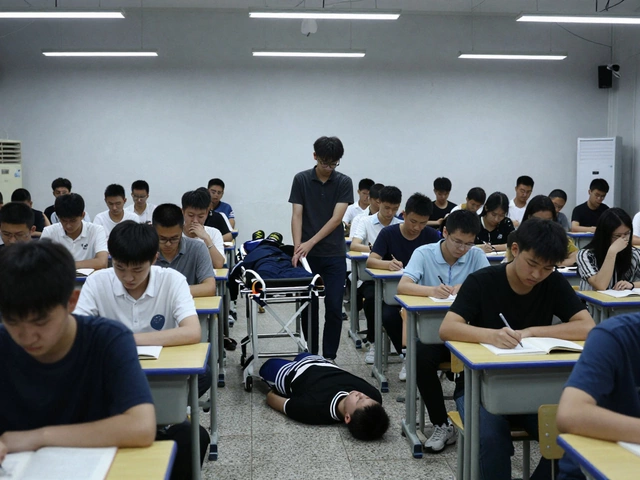So, you've set your sights on cracking the IIT JEE, and you're considering doing it all by yourself. Sounds challenging, right? But here's the secret: it's entirely doable! Many have done it before, and you can too, with the right approach and mindset.
First things first, let's get a clear picture of what IIT JEE is. It's one of the toughest exams out there, known for its ability to separate the wheat from the chaff. But cracking it doesn't necessarily mean spending long hours in coaching centers.
Self-study can be a game-changer if done correctly. It gives you the flexibility to structure your study time, pick resources that work best for you, and focus deeply on areas where you need improvement. Remember, it's about quality over quantity. Dig deep into concepts rather than skimming over them.
Understanding IIT JEE
Alright, let's break this down. The IIT JEE is not just any exam; it's like the Olympics of entrance exams for Indian engineering aspirants. What's cool yet daunting is that it's divided into two parts: JEE Main and JEE Advanced.
JEE Main vs JEE Advanced
JEE Main is the first hurdle. It's the qualifying exam for JEE Advanced and for admissions to other engineering institutes across India like the NITs. It covers Physics, Chemistry, and Mathematics, and each subject has its weightage.
Once you clear the Main, JEE Advanced is what truly tests your mettle. This exam opens the gates to the prestigious IITs. It's tougher, requires a deeper understanding of concepts, and problem-solving skills are put to the ultimate test.
What's Tested?
Both JEE Main and Advanced gauge your grasp of concepts, analytical skills, and the ability to apply theoretical knowledge in practical situations. It's less about rote learning and more about understanding the intricacies of each subject.
Why is it Tough?
Why's it considered one of the toughest, you ask? It's the sheer competition. With lakhs of students competing for a few thousand seats, the stakes are high. Plus, the questions are designed to challenge your understanding and clarity over topics.
Statistics to Know
| Year | Applicants (in lakhs) | Qualified for Advanced |
|---|---|---|
| 2022 | 9.5 | 2.5 lakh |
| 2023 | 10.2 | 2.6 lakh |
So, tackling exam preparation requires a solid understanding of what you're up against. This is just the beginning, but with self-study, the right resources, and a strategic plan, you're well on your way to nailing it!
Self-Study Strategies
Diving into self-study for cracking the IIT JEE might seem daunting at first, but it gets easier if you have a plan. First and foremost, consistency is your best buddy. It's not about studying non-stop every day, but about making sure your efforts are effective and regular.
Planning Your Study Time
Decide how many hours you can dedicate daily. Stick to a routine and make sure it includes time for breaks. Overloading isn't helpful; your brain needs rest to think and retain information effectively. Plan short focused sessions with regular intervals to recharge.
Choosing the Right Material
Not all study materials are created equal. You need resources that offer depth rather than breadth. NCERT books should be your starting point, especially for Physics and Chemistry. For Mathematics, try books like RD Sharma and practice papers. Choose one or two good reference books rather than getting overwhelmed with too many.
Developing Clarity in Concepts
A strong grasp of concepts is essential for IIT JEE. If something isn't making sense, don't just move on. Take your time to understand it, look for online lectures or free resources that break it down into simpler parts. YouTube channels like Khan Academy can really help in understanding tough topics.
The Power of Practice
Practice is key. Solve previous years' question papers and take timed mock tests to simulate exam conditions. Not only does this improve your speed, but it also gives you a clear sense of where you stand.
| Component | Study Time Allocation (%) |
|---|---|
| Concept Understanding | 40% |
| Practice Problems | 30% |
| Mock Tests | 20% |
| Revision | 10% |
Remember, self-study isn't just about studying hard; it's about studying smart. Stay motivated by setting short-term goals and rewarding yourself when you hit them. You'll find yourself not just ready for the IIT JEE, but confident and prepared.

Resource Management
When you're aiming to crack IIT JEE without coaching, managing your resources becomes the make-or-break factor. You need to be smart about which books and materials you're using, because let’s face it, there are tons out there.
Choosing the Right Books
The market is flooded with books, but some have stood the test of time. Here’s a quick shortlist to kickstart your preparation:
- Physics: H.C. Verma's "Concepts of Physics" is a classic. It’s great for building concepts.
- Chemistry: For Organic Chemistry, Morrison and Boyd is highly recommended. For Physical Chemistry, keep an eye on O.P. Tandon.
- Mathematics: R.D. Sharma does a great job for basics, while Arihant’s books provide good practice for advanced problems.
Utilizing Online Resources
We live in the digital age, so why not use it to your advantage? Websites like NPTEL, Khan Academy, and Coursera offer free lectures and materials that can be integrated into your study plan. Remember, the idea is to add variety and context to textbook learning.
Planning Your Study Time
Allocate time wisely. Here’s a simple plan:
- Start with a topic you're completely new to. Spend time reading and understanding the theory.
- Once you have a basic understanding, tackle some practice problems. Begin with easy ones and then move to the challenging problems.
- Aim for at least a couple of mock tests a week. They highlight strengths and areas needing work.
Monitor Progress
Keep track of what you've covered using a journal or a digital planner. It keeps you motivated seeing how far you’ve come, and gives you a sense of achievement with every milestone.
Remember, it's a marathon, not a sprint. Manage your resources well, and you’ll be well on your way to conquering the IIT JEE through self-study!
Real Success Stories
When it comes to cracking the IIT JEE without attending a single coaching class, there are several inspiring stories that show it's not just a dream but an achievable goal.
Ankit Goyal
Ankit Goyal's story is a famous one among JEE aspirants. Despite not enrolling in any coaching classes, Ankit secured AIR 1 in JEE Advanced 2013. How did he do it? Consistent self-study and a strict daily routine. Ankit focused on understanding concepts thoroughly and practiced religiously with mock tests. His success is a testimony that self-discipline and determination can beat any odds.
Ravi Baranwal
Another interesting case is Ravi Baranwal, who did not attend formal coaching classes but managed to grab an impressive rank. Ravi focused heavily on NCERT books and online resources, which are freely available. He emphasized understanding the exam pattern and previous years' question papers, making sure there were no weak areas in his preparation.
Women Who Broke Stereotypes
Let's not forget the story of Anwesha Mukherjee, who proved that talent knows no gender. Struggling with limited resources, she used library books and online tutorials to prepare. Anwesha's journey was a clear indicator that strong willpower can help you overcome resource constraints.
These success stories highlight common threads: self-discipline, strategic resource use, and relentless practice. Whether it's using online resources, making personalized notes, or doing tons of mock tests, these students crafted their unique paths to success. It's about smart work, not just hard work!



